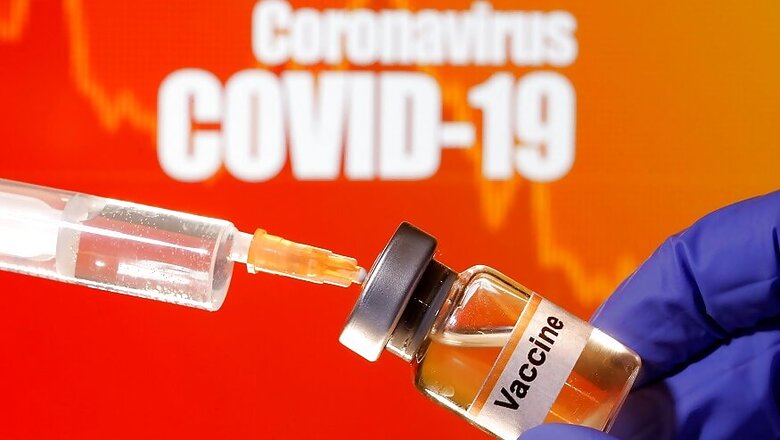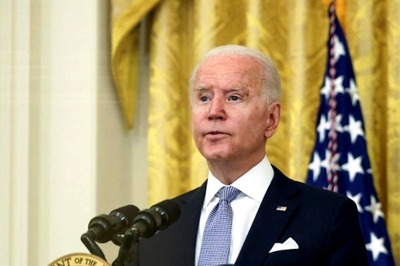
views
As the coronavirus pandemic continues to spread unabated, cumulative cases in India breached the one million-mark on Thursday. With little or no signs of the pandemic slowing down across large parts of the world, the race for developing experimental vaccines is progressing at a breakneck speed that has not seen before. In just six months since the virus came into existence, 140 vaccine candidates (vaccines under experimentation) are in the pre-clinical trial stage and 23 are in the clinical evaluation stage, according to the World Health Organization (WHO).
In normal times, vaccine development takes years as research is largely dependent on grants and funds. The widespread impact of the pandemic has spurred governments, pharmaceutical companies and global alliances to fund vaccine research more liberally, thus contributing to a speedy development in a big way. The types of vaccines also differ, ranging from ones that use an inactivated or dead virus to trigger an immune reaction to non-replicating viral vectors which involves using a different, harmless virus to deliver the pathogens into the body for generating an immune response.
Among the 23 vaccine candidates that have entered the human trial stage, News18.com delves into the progress of four experimental vaccines; two Indian and two international ones.
Moderna
US-based Moderna was the first company to be off the blocks with a vaccine candidate. The company created the first doses of its mRNA-1273 (messenger RNA) vaccine in 42-days flat and sent it to their partner, the National Institute of Allergy and Infectious Diseases for testing. It was the first vaccine to enter the preclinical animal studies stage and first to examine the vaccine on humans.
According to clinicaltrials.gov, a US-government registry of clinical trials, Moderna’s vaccine will start the crucial Phase-III of clinical trials at the end of July. Around 30,000 participants aged 18 years and older will be enrolled for this trial that will evaluate the efficacy, safety and immunogenicity or immune response of the body after the vaccine is injected.
The randomised, stratified, observer-blind, placebo-controlled study will see one group receiving one intramuscular injection of 100 microgram and one group will be administered a placebo or dummy injection.
According to the National Institutes of Health (NIH), the national medical research agency of the United States, mRNA vaccine directs the body’s cells to express or create a virus protein to spur an immune response. The Phase-I studies, meant to test the vaccine’s safety, began from March 16. The results of this phase, involving 45 healthy people aged 18-55 years, were published recently in the New England Journal of Medicine (NEJM).
The results were encouraging and the vaccine induced anti-SARS-CoV-2 immune responses in all participants, and no trial limiting safety concerns were identified, the paper published in NEJM stated. Three-doses were administered to the trial participants and a strong immune response was seen. However, there were side-effects seen after the third dose.
The most commonly reported side-effects or adverse events were fatigue, chills, headache, myalgia. Some also experienced pain at the injection site and these effects were mild or moderate in severity, the paper stated.
Oxford University – AstraZeneca vaccine
If Moderna was the first to be off the blocks with the experimental vaccine, then the vaccine developed at Oxford University in collaboration with AstraZeneca has been touted as one which is the most advanced stage of clinical trials. The vaccine has been developed by a team at The Jenner Institute, University of Oxford and Phase-I trials had begun in England to test safety and efficacy in late April. On April 30, the University of Oxford and AstraZeneca announced an agreement for the global development and distribution of the university’s potential vaccine.
“Under the agreement, AstraZeneca would be responsible for the development and worldwide manufacturing and distribution of the vaccine”, the company’s press release on the agreement read.
The Oxford vaccine is called ChAdOx1 nCoV-19 and it is made from a weakened version of a common cold virus (adenovirus) that causes infections in chimpanzees and it has been genetically changed so that it is impossible for it to replicate in humans, the University of Oxford said.
The vaccine type is known as a viral vector type since it uses a harmless virus as a carrier to deliver the genetic material of a pathogen into cells to create an immune response. Even though the Oxford team has not released any data on the trials so far, pre-clinical trials on monkeys showed that the vaccine was effective in stopping the coronavirus infection from progressing to pneumonia.
The vaccine protected the monkeys from pneumonia and other serious symptoms but it did not kill the virus, said a preprint published in bioRxiv, a free online archive and distribution service for unpublished preprints in the life sciences.
The phase-I trial, carried out in England, involved 1,112 participants. Currently, Phase-III trials have begun in South Africa and Brazil. These countries were chosen for the trials to enable adequate participation in trials.
The phase III part of the study involves assessing how the vaccine works in a large number of people over the age of 18. This group will allow an assessment of how well the vaccine works in preventing people from becoming infected with COVID-19, the University of Oxford had said.
Reports in the British press have stated that there will be positive news soon on the initial trials of the Oxford vaccine.
The Oxford vaccine has an Indian connection on the manufacturing end of the vaccine. Serum Institute of India, Pune, has entered a manufacturing partnership with AstraZeneca to produce and supply one billion doses of the vaccine.
“As a partner Serum Institute of India, will distribute the vaccine to middle and low-income countries across the world. In addition to this, we will also facilitate human trials in India, which are expected to commence in August 2020,” Adar Poonawalla, CEO, Serum Institute of India told News18.com over email.
An experimental batch of the vaccine has also been sent to a government lab in Kasauli, Himachal Pradesh to test its sterility, the company confirmed.
Bharat Biotech’s Covaxin
On June 29, Bharat Biotech Limited obtained the central drug regulator’s approval to go ahead with human trials of one of the two indigenous vaccines named Covaxin. The Hyderabad-based company received a strain of the virus from National Institute of Virology, Pune, to grow and replicate the vaccine candidate.
Phase-I of the human clinical trial of Covaxin began on July 15. The randomised, double-blind, placebo-controlled clinical trial will include 375 volunteers in India and trials have reportedly begun at the Post Graduate Institute of Medical Sciences, Rohtak.
Bharat Biotech has developed an inactivated virus vaccine. This involves a heat-killed or dead virus that is used to generate an immune response. The company has used this platform in the past to manufacture Rabies, Japanese Encephalitis and Rotavirus vaccines. A company representative told News18 that BBV 152 vaccine was evaluated in animals on Schedule Y guidelines from India and WHO. It was reported to be safe and immunogenic in all animals.
As per the Clinical Trial Registry of India, 12 centres have been identified for the human trials of the vaccine. The Phase-I studies will look at the occurrence of immediate adverse events or side-effects following vaccination. Whether there are adverse reactions will be checked within hours, during the days of vaccination and through the duration of the study. The company intends to enrol 1,125 people for Phase-I and II of the trials.
Zydus Cadila’s ZyCoV-D vaccine
Gujarat-based Zydus Cadila’s plasmid DNA vaccine initiated Phase-I/II clinical trials earlier this week. Partially funded by the Department of Biotechnology, Government of India, the vaccine did pre-clinical studies on animals and found an immune response in mice, rats, guinea pigs and rabbits. In rabbits, up to three times the intended human dose was found to be safe, well-tolerated and immunogenic, the company claimed in a press release issued along with the Ministry of Science and Technology.
“The antibodies produced by the vaccine were able to neutralize the wild type virus in virus neutralisation assay indicating the protective potential of the vaccine candidate. No safety concerns were observed for the vaccine candidate in the repeat dose toxicology studies by both intramuscular and intradermal routes of administration,” the release read.
The company said that the adaptive Phase I/II dose-escalation, multi-centric study will assess the safety, tolerability and immunogenicity of the vaccine. The clinical trials registry – India website showed that the company has aimed to enrol 1048 volunteers for the trial.




















Comments
0 comment